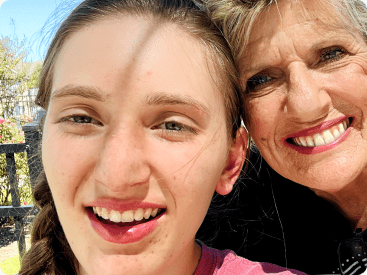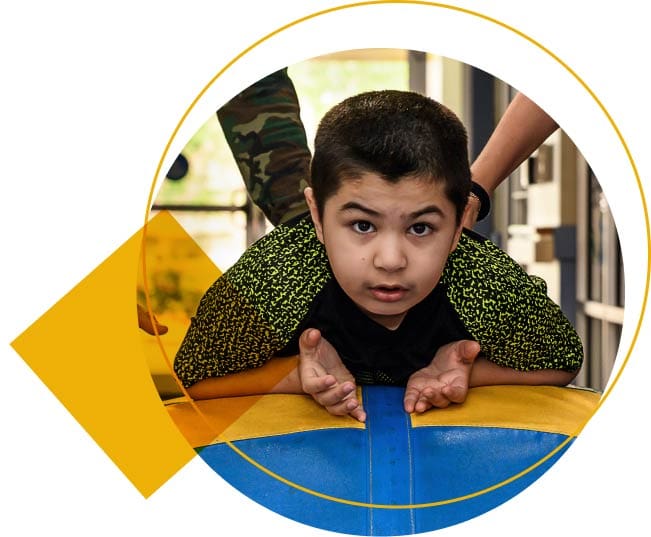
Inpatient treatment for complex medical conditions combined with severe intellectual or developmental disabilities
Helping medically complex patients with severe autism and other developmental disabilities experience fulfilling lives
Everyone has a unique path in life. We help children, adolescents, and young adults with complex medical conditions and intellectual or developmental disabilities, such as severe autism, find their way.
The New Directions Program is designed to meet young people at their unique skill levels — and empower them to navigate toward healthy futures. The program also supplies caregivers with the tools they need to support continued progress at home, in school, and within the community.
Through specialty programming, personalized curriculum, and medical expertise, our interdisciplinary team makes remarkable strides with patients, because we’re experts at mending minds.
A compassionate care environment tailored to medically complex young people with neurodevelopmental disorders, including severe autism
Typical patient characteristics:
- Patient has significant medical needs, substantial physical impairments, and intricate communication needs (for example, non-verbal autism with seizure disorder and diabetes)
- Patient has exceptionally challenging and maladaptive behaviors that community services alone have not successfully managed
- Handicapping aggression to self or others
- Inability to perform basic activities of daily living (ADLs) or academically appropriate activities
- Repeated hospital stays due to behavior dysregulation
A personalized approach to treatment for developmental disabilities
Children, adolescents, and young adults with medically complex needs and developmental disabilities such as severe autism have very limited care options. Hospitals often discharge these patients quickly because of difficult behaviors — which is why Nexus is different. Our specialty programming, combined with in-depth virtual and in-person caregiver training, gives patients and their families a solid foundation on which to build at home.
Program features:
- Interdisciplinary, physician-led teams and consultants specializing in neurology, pediatrics, physical rehabilitation, and psychiatry
- Comprehensive evaluations and assessments completed by physicians, behavioral analysts, and licensed physical, occupational, and speech therapists
- Individualized plans addressing developmental delays, including communication, sensory processing, social interaction, interest/item/activity fixation, and repetitive behavior patterns
- Access to a multi-sensory room for relaxation and sensory-based interventions
- Group activities — led by rehabilitation therapists, recreational therapists, and licensed clinical social workers — that promote physical, communication, cognitive, social-emotional, and functional skills. Evidence-based milieu therapy and naturalistic teaching
- Weekly activities to assist with reintegration into the school environment
- Instruction in pragmatic and social-emotional learning skills
- Music, art, and animal-assisted therapy to encourage attention, participation, self-awareness, and coping skill development
- Thematic curriculum, including topics such as communication, cognitive skills, motor enrichment, literacy, and mathematical concepts
Wonder what makes severe autism different from milder forms of autism? Learn here.
MORE ON SEVERE AUTISM
MEET A New Directions PROGRAM SUCCESS STORY
“Maddie now lives in her own space — dubbed “Maddie’s House.” A rotating, 24/7 care staff uses the routine she enjoyed at Nexus, allowing her to achieve the highest level of independence possible.”
– Tabitha, Maddie’s Mother
Evidence-based, thematic curriculum that helps patients gain skills and confidence
We use specific metrics to evaluate progress with communication and behavior.
Testing is conducted at admission and throughout the patient’s stay, allowing treatment plans to adapt and evolve as patients make progress.
- Aberrant Behavior Checklist: Measures behavioral disturbances and psychiatric symptoms
- Communication Matrix: Assesses all types of communicative behavior
- DBC-2: Evaluates emotional and behavioral dysregulation and monitors interventions and medication usage
- Modified Overt Aggression Scale-Revised (MOAS): Measures destructive verbal and physical aggression
- Vineland-3: Assesses individuals with intellectual and developmental disabilities
- Wee-FIM: Evaluates progress in formal physical, occupational, and speech therapies
Neurodevelopmental program services
